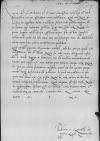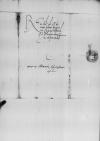Letter #2290
Piotr GAMRAT to Ioannes DANTISCUSCracow (Kraków), 1540-03-10
| received Guttstadt (Dobre Miasto), 1540-03-23 Manuscript sources:
| ||||
Text & apparatus & commentary Plain text Text & commentary Text & apparatus
Reverendissimo in Christo Patri et Domino
Reverendissime in Christo Pater et Domine, frater et amice carissime.
Salutem et omnem felicitatem, meique officiosam commendationem.
Quod Vestra Reverendissima Dominatio litteris suis me appellare voluit cunctaque felicia mihi precari, magnas illi eo nomine ago habeoque gratias. Ego vicissim Vestrae Reverendissimae Dominationi precor longam valetudinem affluentemque felicitatem. Ignoscet autem mihi, quod his litteris manu mea non subscripsi. Nam dominus
Quod attinet negotium
Quod reliquum est, opto Vestram Reverendissimam Dominationem quam diutissime saluam esse et felicem.
Cuius fraterno amori et beneuolentiae me commendo.


 BCz, 1597, p. 972
BCz, 1597, p. 972